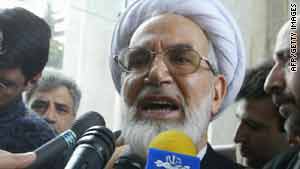 Mehdi Karoubi, the Iranian opposition leader, said on Tuesday that the demonstration planned in Tehran next week in solidarity with the protest movements in Egypt and Tunisia is both a test of the Iranian regime and its opponents.
Mehdi Karoubi, the Iranian opposition leader, said on Tuesday that the demonstration planned in Tehran next week in solidarity with the protest movements in Egypt and Tunisia is both a test of the Iranian regime and its opponents.
Since the Iranian government is painting events in Cairo and elsewhere as the long-awaited regional blossoming of its own Islamic revolution, to deny a permit for such a march would show that their position in support of the Arab movements is fake, Mr. Karoubi, 72, said in a rare interview from Tehran, conducted via a video-Internet link.
For the opposition, events in Cairo mirror the post-election protest movement in Iran circa 2009, not 1979, and could give new blood to the Green movement for political reform that he said has largely been battered into submission by government oppression.
“Any kind of event that involves the rise of the people and the fight against dictatorship in the Muslim world is in our benefit,” said Mr. Karoubi, speaking in Persian from inside the isolation of his home. “Next Monday will be a test for the Green movement—if the government issues a permit, there will be a huge demonstration and it will show how alive the Green movement is.”
Both sides are invested in the outcome in Egypt because of possible repercussions in Iran. There is an imperfect connection between the two — the ancient enmity between Persians and Arabs has extended into the modern era, amplified by the fact that the majority of Iranians are Shiite Muslims while the Arab world is overwhelmingly Sunni.
But events in each can echo in the other, with President Mahmoud Ahmadinejad gaining widespread popularity among ordinary Arabs in recent years for his belligerent posture towards the United States and Israel.
Given that no country in the Arab world followed the lead of Iran’s Islamic rule, Tehran has tried to leverage its stance on the Arab-Israeli dispute into a means to influence other Arab countries. Now it seeks to portray the political unrest in Egypt, Tunisia and elsewhere as the long-delayed rippling of the Islamic revolution through the neighborhood. The supreme leader, Ayatollah Ali Khamenei gave a prayer sermon last Friday lauding the demonstrators.
Mr. Karoubi said that all the news on the official media tends to highlight statements from Islamist organizations and focus on Western concerns that the Muslim Brotherhood is about to triumph. Hence the pressure on the Iranian government to allow the protest March through downtown Tehran to go forward next Monday despite the risk that it could be transformed into an anti-government rally of the kind not seen in a year.
“If they are not going to allow their own people to protest, it goes against everything they are saying, and all they are doing to welcome the protests in Egypt is fake,” Mr. Karoubi said.
The Green movement had done everything it can to highlight the incongruity between the Iran government’s oppression at home over civil rights while it welcomes such political protests elsewhere.
The Kalame website of Mir Hossein Mousavi, the other main opposition leader, recently displayed two pictures side by side.
One showed Egyptian police beating a protester, while the other was a similar shot of Tehran security forces. The Egyptian protester was labeled “heroic” while that in Iran was an “agent of imperialism.”
Mr. Karoubi said he was living under near house arrest, with guards outside his house most of the day turning many visitors away. He had not talked with a foreign journalist in about six months, he said, although he occasionally answered questions via Email.
He was able to plan the call for the protest with Mr. Mousavi because the two met at a wake, he said, but otherwise they have limited contact. They have not decided yet whether the march through downtown Tehran should be silent, he said.
Should the young Egyptian protesters with their cyber-campaign succeed in fomenting change, that would bring added pressure on the Iranian government. It would mean that both Turkey and Egypt, the most populist states in the region, are more democratic than Iran, Mr. Karoubi said.
“It will show that Iran has been left behind, that it has not gone forward with the principles of the revolution that everything should be based on the vote of the people,” he said.
If they fail it will be a setback for the Green movement in seeking change, but again the regional differences are big enough that things that the reform movement will still continue.
“It could have a bad effect in Iran, but not that strong,” he said. “We have our own demands and our own desire for freedom in our own society—we were promised freedom with the revolution and never got it.” NYT

Leave a Reply
You must be logged in to post a comment.